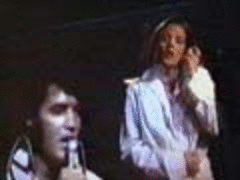
THE DUETOn August 16, 1997, marking the occasion of the twentieth anniversary of the passing of Elvis Presley, Elvis Presley Enterprises and SEG Events presented Elvis in Concert '97 to a sell-out crowd at the Mid-South Coliseum in Memphis, Tennessee. It featured a great gathering of many of the outstanding instrumentalists and vocalists who had worked on stage and in the recording studio with Elvis over the years. The late Elvis Presley, via video, starred in the show. His former band members and The Memphis Symphony Orchestra performed live. This production more or less became the prototype for Elvis-The Concert, a smaller-scaled production that has toured extensively since early 1998. A major reunion concert on the scale of the 1997 show was called Elvis-The 25th Anniversary Concert, a sold-out smash at The Pyramid arena in Memphis on August 16, 2002.
And the highlight of the show was Lisa Marie singing "Don't Cry Daddy" with Elvis. It brought thunderous applause and many say there wasn't a dry eye in the coliseum.




ELVIS' DAUGHTERSuspicious minds are wrong to think Elvis' girl is cashing in.When Lisa Marie Presley was three, her father, Elvis, would stand her on a table and get her to sing for his guests. "I had no aspirations to sing," she said 32 years later, "but the desire to please him." Looking down in the middle of a slow, jet-lagged sentence, Lisa Marie widens her eyes as though to refocus. You see the unusually straight lines of her features, and when she looks up with the hint of a grin, her eyes acquire a lustre that appears both roguish and regal, in a lazy southern way.
And then you feel as if you're looking into the eyes of Elvis; that the voice and expressions have cohered in such a way as to ventriloquise his presence. In this instant, Lisa Marie becomes almost too unnervingly recognisable - too beautiful - to comprehend - how could the female Elvis be anything else?

















